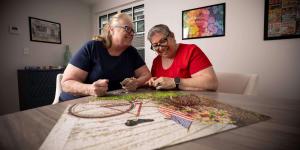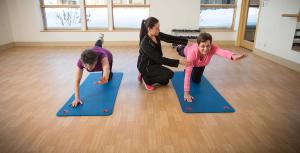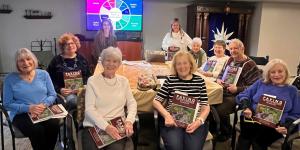10 Summer Exercise Tips for Seniors

Summertime is here and with it comes the desire to get outdoors and be active. From golf to gardening, there is no lack of excuses to get outside and soak up some sun.
As the manager of the senior fitness program at Hebrew Rehabilitation Center in Boston, every day I see how the right kind of exercise helps older adults feel stronger and more confident. It’s a great way to make friends and be engaged in your community. And of course, there are a myriad of health benefits to exercising at any age.
At the same time there are precautions that you should take when exercising in the summer to make sure the risks don’t outweigh the benefits. Older adults in particular can be more sensitive to high temperatures and at a greater risk of dehydration, heat stroke, and other dangerous conditions.
Risks of excessive heat for seniors
Adults over age 65 are at greater risk of heat-related illnesses, known as hyperthermia. This can include heat stroke, swelling in your feet and ankles, sudden dizziness after exercise, cramps, and heat exhaustion.
According to the National Institute on Aging, the following conditions can increase an older adult’s risk of hyperthermia:
- Age-related changes to the skin such as poor blood circulation and inefficient sweat glands
- Heart, lung, and kidney diseases, as well as any illness that causes general weakness or fever
- High blood pressure or other conditions that require changes in diet, such as salt-restricted diets
- Reduced sweating, caused by medications such as diuretics, sedatives, tranquilizers, and certain heart and blood pressure drugs
- Taking multiple medications
- Being substantially overweight or underweight
- Drinking alcoholic beverages
- Being dehydrated
Other things that can increase the risk of experiencing heat-related illness include being in overcrowded conditions, lack of access to air conditioned spaces, and overdressing.
However, there are so many benefits to remaining active as you get older that you should take the time to create a plan for how you can get some exercise even when heat and humidity are high.
Tips for staying cool while you exercise
Here are ten tips for beginning or maintaining an exercise program during the summer:
- Consult your doctor before beginning any exercise program, even if it’s billed as an easy exercise for seniors.
- Know your limits. Don’t push yourself. There are plenty of days ahead and time to build strength and stamina.
- Stay hydrated – make sure you drink plenty of water when working up a sweat. Carry a water bottle with you when you leave the house, especially if you are gone for most of the day, and drink from it regularly.
- Avoid exercising between 10:00 am and 2:00 pm when the sun is at its strongest. Walk on a trail or in a park where you can stay in the shade.
- Break exercise into shorter chunks, like three 10-minute walks instead of one 30-minute walk. Research shows that short bursts of exercise spread throughout the day are just as effective as longer sessions.
- Use sunscreen with an SPF of at least 15—higher is even better—applying it liberally and often, and after swimming (even with waterproof sunblock).
- Exercise with a buddy – don’t go it alone. Not only can you motivate each other, but there is someone with you should you need help.
- Wear protective clothing, a wide-brimmed hat, and sunglasses, especially if you require a prescription.
- When it’s really hot out, try slower-paced but equally effective types of exercise like yoga and Tai Chi. Or, get in the water – go for a swim or to a water aerobics class. Just make sure a lifeguard is on duty.
- Apply insect repellent to protect yourself from insect bites that spread illnesses.
Symptoms of heat stroke
Heat stroke is a severe form of hyperthermia that can be dangerous, even deadly. It occurs when the body is overwhelmed and can’t regulate its temperature. Watch out for these symptoms and call 911 if you notice them in yourself or another person:
- Body temperature of over 104°F
- Fainting
- A change in behavior, like confusion, combativeness, staggering, possible delirium or coma
- Dry, flushed skin and a strong, rapid pulse
- Lack of sweating
In addition to calling 911, if you notice these symptoms you can move to a cool, shaded place; have some water or fruit juice; and place a cold wet cloth on the wrists, neck, armpits, and groin.
Supervised indoor workout options for seniors in Boston
Another great option is to exercise indoors at a program like Get Up & Go, which is a supervised senior fitness program offered at Hebrew Rehabilitation Center in Roslindale. Exercise physiologists who specialize in working with older adults will create an individualized workout program for you that focuses on strength, balance, and endurance. Your workouts will be overseen by our team of professionals who’ll give you ongoing guidance and encouragement – all for less than the cost of a personal trainer or boutique fitness studio. Ready to give it a try? Call us today at 617-363-8539 or contact us online. I’d love to see you in the gym!
Blog Topics
Learn More
Senior Fitness
Our exercise physiologists specialize in fitness for older adults and will develop a personalized exercise program for you.
Wellness Coaching
We empower seniors to meet their wellness goals using Vitalize 360, an innovative health and wellness platform that combines one-on-one coaching with research-based tools.




